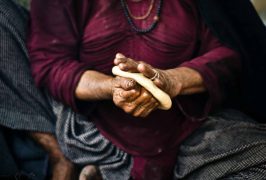Today, the National Inquiry into Missing and Murdered Indigenous Women and Girls released its final report, along with 231 Calls for Justice to protect Indigenous women, end violence against Indigenous women, and promote their substantive equality. LEAF worked tirelessly with its partners to advocate for an Inquiry, was a party with national and regional standing in the Inquiry, and will continue to work to ensure that the Inquiry’s Calls for Justice are implemented.
LEAF is deeply grateful to the many Indigenous women and families who travelled great distances to share their stories with the Inquiry. We acknowledge the pain and trauma inherent in doing so. LEAF counsel at the Inquiry, Mary Eberts, says, “We are grateful that you undertook the task of sharing your experiences, to contribute to greater equality for all Indigenous women. We encourage all governments in Canada to respond meaningfully to the Inquiry’s Calls for Justice to ensure their efforts were not in vain.”
The report makes critical findings that are consistent with the work of Indigenous feminists and LEAF over the past many decades. It identifies the root factors of Indigenous women’s inequality and violent victimization, including Indigenous women’s social and economic inequality, biased policing, an unfair justice system, and a broken child welfare system. Perhaps most critically, the Inquiry expressly recognizes colonization as a root cause of Indigenous women’s inequality. The Report states: « Colonization has jeopardized Indigenous women and 2SLGBTQQIA people’s rights to culture, health, security, and justice in distinct, though related ways, when compared to the experiences of Indigenous men and boys. »[1]
It is high time to recognize that colonialism and racism have particular, gendered harms that deny Indigenous women equality. Addressing the harms of colonization is essential to improving the condition of Indigenous women and tackling the crisis of murder and violence committed against them. As LEAF has argued in cases such as Gehl v AG Ontario, “[t]he disadvantaged position of Indigenous women in Canadian society is the result of complex social and legislative forces tied to colonization, racism and misogyny, including the Indian Act itself.”[2]
LEAF long advocated for an Inquiry, with the goal of bringing to light these significant social realities and calling on all governments to respond. The report includes many important Calls for Justice, and LEAF now urges that they be implemented. In particular:
- Canada must implement a National Action Plan on violence against Indigenous women;
- Canada must eliminate the sex discrimination embedded in the Indian Act; and
- All governments in Canada must take immediate action to end the ongoing colonization of Indigenous peoples and Indigenous land.
As argued in LEAF’s final submissions to the Inquiry, governments must recognize that Indigenous peoples have a right to appropriate redress for loss of their land, whether that be by way of money or new land. Without that crucial element, the dismantling of colonialism becomes even more difficult.
LEAF’s final submissions to the Inquiry are available here.
In the words of the Honourable Justice Murray Sinclair, Chair of the Truth and Reconciliation Commission, « We are at the beginning of a journey towards a more just, fairer, and more courageous country. We all have the opportunity to show leadership, courage and conviction in helping to heal the wounds of the past. »[3]
The Calls for Justice in this Report are another opportunity to show this leadership and courage. LEAF will be watching, alongside Indigenous women and their allies, to ensure that steps are taken on this journey without delay.
We encourage media to engage with this critical report. For media inquiries, we request that media contact Indigenous women, who are best placed to respond to questions about Indigenous women’s lives. LEAF recommends as excellent media contacts:
Dr. Pamela Palmater, Chair in Indigenous Governance at Ryerson University
T: 905-903-5563
[email protected]
See also Dr. Palmater’s press release.
Tania Budgell, Pauktuutit Inuit Women of Canada
Director of Communications
T: 613-238-3977 ext. 239
C: 613-316-8943
[email protected]
See also Pauktuutit’s press release.
[1] National Inquiry into Missing and Murdered Indigenous Women and Girls, “Reclaiming Power and Place”, Executive Summary of the Final Report, National Inquiry into Missing and Murdered Indigenous Women and Girls (Ottawa, 2019) at 17.
[2] Gehl v Canada, 2017 ONCA 316, factum of the intervener, LEAF (Women’s Legal Education and Action Fund).
[3]“Statement from the Chair, Justice Muyrray Sinclair”, Canada’s Residential Schools: The Final Report of the Truth and Reconciliation Commission, (Canada, 2015) at vol vii.
